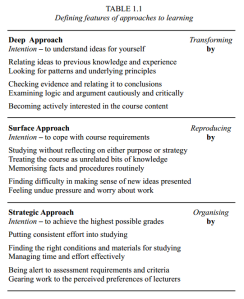Activity 1

I have definitely observed all of these approaches in my language blended courses!
Students that follow the Deep approach take advantage of every learning opportunity, tackle tasks with enthusiasm and in general "dance to the music" and have a great time doing it! :)
The other big proportion of students are Strategic. They participate in the tasks but they are more worried about the "steps" than they are about "dancing"! They want to know how many times they need to participate in the forum, how many words they should write in the blog and what's going to be included in the test. They eventually get there, but I don't think they enjoy it very much.
There is also a small proportion of students that take very little part if any in the tasks proposed. They try to memorise grammar rules and vocabulary but that approach does not help them perform in a real life situation. These students often fail the course.
I would like to think that on ocTEL I employ strategies from the Deep Approach, however it is sometimes very tempting to opt for the strategic option.
I believe that learners who tend to take a ‘surface’ approach might be able to learn a bit more effectively on-line as they can take advantage of the work done by other students. In a face-to-face class, they are usually left behind when their lack of preparation hinders their ability to participate in class tasks. On-line however they can take advantage of material shared by their peers.
Deep learning can be encouraged by presenting students with authentic situations that motivate them to explore and reflect on the topic discussed.
Excellent reflection on this questions here:
http://chcoll.wordpress.com/2014/05/12/octel-activity-week-2-approaches-to-learning/
Encouraging a balance of deep and strategic approaches might help students stay focus.
